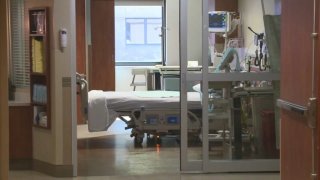
Connecticut has registered more than 10,000 deaths associated with COVID-19 since the beginning of the pandemic, according to data released Tuesday by the U.S. Department of Health and Human Services.
There have been 10,076 deaths linked to COVID-19 as of Tuesday, marking the 29th highest overall death count in the country, according to researchers from Johns Hopkins.
While the number is “profound” and marks a “very sad statistic” for the state, Dr. David Emmel, chair of the Connecticut Medical Society's legislative committee, said “what's even more discouraging is that people are continuing to die when they don't have to because most of them, almost all them, are people who are unvaccinated.”
For the week beginning Jan. 16, unvaccinated people in Connecticut were nearly 13 times more likely to die from COVID-19 compared to fully vaccinated persons, according to state of Connecticut data.
Get Connecticut local news, weather forecasts and entertainment stories to your inbox. Sign up for NBC Connecticut newsletters.
Dr. Manisha Juthani, the state's public health commissioner, said in an interview with The Associated Press that while a “very small percent” of Connecticut residents who've been vaccinated and boosted have died — eight people who received a booster shot were among a recent group of 212 deaths reported earlier this month — COVID-19 has become a “largely vaccine preventable disease.”
“And for those who have been still waiting, who still can consider getting a shot, it just makes me continue to want to try to reach those people before the virus gets them,” said Juthani, who acknowledges some people will never agree to get vaccinated.
Juthani said the state is currently headed in the right direction when it comes to COVID-19, citing declining case rates and hospitalization numbers. But she stressed the pandemic is not yet over and new variants may arise.
The commissioner said she now faces the challenge of convincing a pandemic-weary public it might have to deal with the ups and downs of COVID-19 as it eventually becomes an endemic disease.
“The challenge is trying to help people understand that we have the tools we need to try to mitigate how this virus overtakes our life,” she said. “We don’t need to live under the same circumstances we had been in the beginning of this pandemic. How do we make that transition to accepting that this virus is here to stay and that we will ramp up and ramp down some of these interventions that we know that work?”
Juthani said the state might have to impose some of those interventions for a while but “it is largely going to go back to people.”
The commissioner said she hopes to launch a media campaign to help people understand how the state plans to transition to learning to live with the virus and managing such flareups.
“My hope is that we continue to see a decline in cases over the next several weeks and that trajectory continues,” she said. “And if we see that, then I think we’ll be able to help people understand and then think about how we discuss and report on this virus thereafter.”

